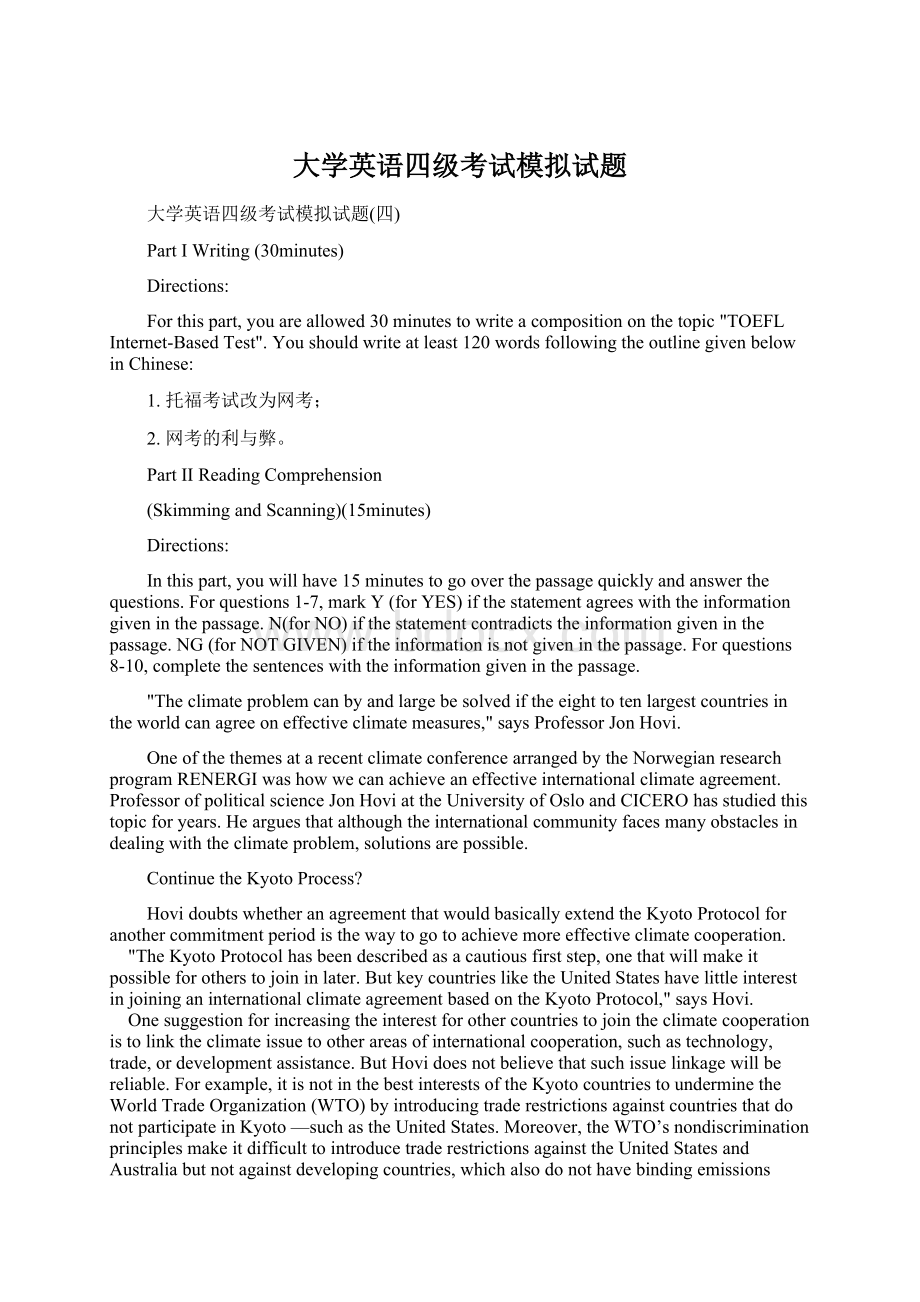大学英语四级考试模拟试题.docx
《大学英语四级考试模拟试题.docx》由会员分享,可在线阅读,更多相关《大学英语四级考试模拟试题.docx(23页珍藏版)》请在冰豆网上搜索。

大学英语四级考试模拟试题
大学英语四级考试模拟试题(四)
PartIWriting(30minutes)
Directions:
Forthispart,youareallowed30minutestowriteacompositiononthetopic"TOEFLInternet-BasedTest".Youshouldwriteatleast120wordsfollowingtheoutlinegivenbelowinChinese:
1.托福考试改为网考;
2.网考的利与弊。
PartIIReadingComprehension
(SkimmingandScanning)(15minutes)
Directions:
Inthispart,youwillhave15minutestogooverthepassagequicklyandanswerthequestions.Forquestions1-7,markY(forYES)ifthestatementagreeswiththeinformationgiveninthepassage.N(forNO)ifthestatementcontradictstheinformationgiveninthepassage.NG(forNOTGIVEN)iftheinformationisnotgiveninthepassage.Forquestions8-10,completethesentenceswiththeinformationgiveninthepassage.
"Theclimateproblemcanbyandlargebesolvediftheeighttotenlargestcountriesintheworldcanagreeoneffectiveclimatemeasures,"saysProfessorJonHovi.
OneofthethemesatarecentclimateconferencearrangedbytheNorwegianresearchprogramRENERGIwashowwecanachieveaneffectiveinternationalclimateagreement.ProfessorofpoliticalscienceJonHoviattheUniversityofOsloandCICEROhasstudiedthistopicforyears.Hearguesthatalthoughtheinternationalcommunityfacesmanyobstaclesindealingwiththeclimateproblem,solutionsarepossible.
ContinuetheKyotoProcess?
HovidoubtswhetheranagreementthatwouldbasicallyextendtheKyotoProtocolforanothercommitmentperiodisthewaytogotoachievemoreeffectiveclimatecooperation.
"TheKyotoProtocolhasbeendescribedasacautiousfirststep,onethatwillmakeitpossibleforotherstojoininlater.ButkeycountriesliketheUnitedStateshavelittleinterestinjoininganinternationalclimateagreementbasedontheKyotoProtocol,"saysHovi.
Onesuggestionforincreasingtheinterestforothercountriestojointheclimatecooperationistolinktheclimateissuetootherareasofinternationalcooperation,suchastechnology,trade,ordevelopmentassistance.ButHovidoesnotbelievethatsuchissuelinkagewillbereliable.Forexample,itisnotinthebestinterestsoftheKyotocountriestounderminetheWorldTradeOrganization(WTO)byintroducingtraderestrictionsagainstcountriesthatdonotparticipateinKyoto—suchastheUnitedStates.Moreover,theWTO’snondiscriminationprinciplesmakeitdifficulttointroducetraderestrictionsagainsttheUnitedStatesandAustraliabutnotagainstdevelopingcountries,whichalsodonothavebindingemissionstargets.
"Besides,historyshowsthatthiskindofpressurerarelyworksonasuperpowersuchastheUnitedStates,"saysHovi.
Anotherobstacleisthatdevelopingcountriesprotecttheirowneconomicdevelopment.TheywillnotacceptbindingemissionstargetsuntiltheUnitedStatesalsoreducesitsowngreenhousegasemissions.Atthesametime,theUnitedStatesisunwillingtoendangerthecompetitivenessofitsownbusinessandindustry,andthusdoesnotwishtoparticipateinaninternationalagreementthatdoesnotalsoincludethedevelopingcountries.
"Toovercomethisparticularobstacle,weshouldfocusonclimatemeasuresthatdonotthreateneconomicdevelopment,"advisesHovi.
TheUnitedStatesisalsodoubtfulabouttheUNsystem,andHovibelievesthatanalternativeinternationalclimateagreementshouldnotnecessarilybeputtogetherwithintheUNframework,astheKyotoProtocolis.
PointofDepartureinAmericanClimatePolicy?
Hovibelievesthatinthelongrun,awaytoreengagetheUnitedStatesmightbetobaseafutureclimateagreementonfederalU.S.climatepolicy.
"TheUnitedStatesisoftenmorewillingtocooperatewhenitalreadyhasanationalpolicyinplace.Forexample,'MontrealProtocolonSubstancesthatDepletetheOzoneLayer’inmanywaysrepresentedaninternationalextensionofaregulatoryframeworkthatalreadyexistedintheUnitedStates.ThusU.S.businessandindustryactedasapusherintheefforttobuildaninternationalagreement."
ButtheproblemwiththispolicyisthattherecurrentlyisnosimilarU.S.climatepolicyatthefederallevel.Whateverpolicyexistsisfragmentedandformativeatbest.
TheKyototargetsarecostlytomeet.Kyotothusdependsoneffectiveenforcement.TheenforcementmechanismthatwasintroducedthroughtheMarrakeshAccordsisprimarilybasedonasystemwherebycountriesthatdonotmeettheirtargetsduringthefirstcommitmentperiodaresanctionedbyhavingtoreduceevenmoreduringthesecondperiod.Theproblemisthatthereisnothingtostopanonobedientcountryfromputtingoffthisadditionalemissionsreduction—perhapsindefinitely.
Inaddition,innocentthirdpartiessufferwhenthesanctionsarecarriedout.Asapotentialbuyerofemissionspermitsandamajorexporteroffossilfuels,Norwaywillbeparticularlyhardhit,becausecarryingoutthepunishmentwillcausethepriceoffossilfueltogodownandthepriceofemissionspermitstogoup.Finally,whereasthecompliancesystemwillpunishacountrythatisamemberandreducesemissions,butfailstoreachitsemissionstarget,itprovidesnobasisforpunishingacountrythatdeclinestobeamemberanddoesnothingtoreduceitsemissions.Thus,thecompliancesystemisarguablyunfair.
Hovithinksthatinternationallyitispoliticallydifficulttoachieveaneffectiveenforcementmechanism.Forthisreason,itmaybeagoodideatofocusonanagreementthatdoesnotneedenforcement.
AnAgreementthatEveryoneWantstoBePartof?
ManyoftheproposedalternativestotheKyotoProtocolresembleKyotointhattheyrequireenforcement.Forexample,thisistrueforregionalclimateagreements,anagreementbasedonemissionsintensitytargets,andanagreementbasedonharmonizedcarbontaxes.Onetypeofagreementthatdoesnotdependonenforcementisanagreementwherethepartiescommittousingemissions-reducingtechnology.
Supplementedwithagreementsontechnologydevelopmentandtransfer,anagreementontheuseofemissions-reducingtechnologycansetconsistenttechnologystandardsinawaythatmakesitinthebestinterestofallcountriestoparticipate.Assumingthatnetworkexternalitiesexist—thatis,thecostsorbenefitsdependonwhetherornotothercountriesalsochoosethesametechnology—theneachcountrywillwanttousethesametechnologyastheothercountries.
Inshort,themorecountriesthatuseacertaintechnology,themoreattractiveitwillbeforotherstoswitchtothistechnology.Anagreementcanenablemany,orevenall,countriestoswitchtomoreclimate-friendlytechnologysimultaneously.
1.TheUSGovernmentrecentlyheldaclimateconferencewithathemeofhowaneffectiveinternationalclimateagreementcouldbeachieved.
2.TheUnitedStateshasgreatinterestinjoininganinternationalclimateagreementbasedontheKyotoProtocol.
3.Developingcountrieswon’tacceptbindingemissionstargetsuntiltheUnitedStatesreducesitsgreenhousegasemissions.
4.TheUnitedStatesisdoubtfulabouttheUNsystem.
5.ItisbelievedthatdevelopingcountrieswillbenefitmostfromtheKyotoProtocol.
6.TheKyotoProtocoldependsoneffectiveenforcementbecauseofthehighcoststomeetitstargets.
7.Internationally,itispoliticallydifficulttoachieveaneffectiveenforcementmechanism.
8.TheUnitedStates_______________whenitalreadyhasanationalpolicyinplace.
9.ManyoftheproposedalternativestotheKyotoProtocolresembleKyoto_____________.
10.Themorecountriesthat_________________,themoreattractiveitwillbeforotherstoswitchtothistechnology.
PartIIIListeningComprehension
(ReadinginDepth)(35minutes)
SectionA
Directions:
Inthissection,youwillhear8shortconversationsand2longconversations.Attheendofeachconversation,oneormorequestionswillbeaskedaboutwhatwassaid.Boththeconversationandthequestionswillbespokenonlyonce.Aftereachquestiontherewillbeapause.Duringthepause,youmustreadthefourchoicesmarkedA),B),C)andD),anddecidewhichisthebestanswer.
11.A)At9:
15.
B)At8:
45.
C)At9:
00.
D)At8:
15.
12.A)Anewdress.
B)Anewdepartmentstore.
C)Anewcar.
D)Anewhouse.
13.A)Inadoctor’soffice.
B)Inashoeshop.
C)Inanoffice.
D)Inahotel.
14.A)It’snotasgoodasitusedtobe.
B)It’sbetterthanitusedtobe.
C)It’sverybadnow.
D)It’sevenworsethanwhatpeoplesay.
15.A)Hewillfindapart-timejob.
B)Hewon’tfindapart-timejob.
C)Hehasalotofpocketmoney.
D)Hedoesn’twanttomakemoney.
16.A)Inthehospital.
B)Inthetheatre.
C)Onthebus.
D)Onthetaxi.
17.A)Hedidn’tknowtherewouldbeheavysnow.
B)Hedidn’tknowtherewouldbesomanycatsanddogsinthestreet.
C)Hedidn’tthinkitwouldrainsoheavily.
D)Heknewtherewouldbealotofcatsanddogsinthestreet.
18.A)Shedidn’twanttomove.
B)Shedidn’tmindmoving.
C)Shedidn’treplydirectly.
D)Shedidn’tunderstandwhatthemansaid.
Questions19to22arebasedontheconversationyouhavejustheard.
19.A)Avilla.
B)Anapartment.
C)Ahotel.
D)Alocalfamily.
20.A)About14days.
B)About5days.
C)About4days.
D)About3days.
21.A)InJuly.
B)InJune.
C)InMay.
D)InApril.
22.A)Thinkovertheprice.
B)Thinkabouttheplace.
C)Discusswithherfriends.
D)Askforanothertravelagency.
Questions23to25arebasedontheconversationyouhavejustheard.
23.A)Sendhimtheinformationonafter-salesservice.
B)Sendhimthebookletaboutthenewestcomputers.
C)Sendhimalistofsoftwareproduct